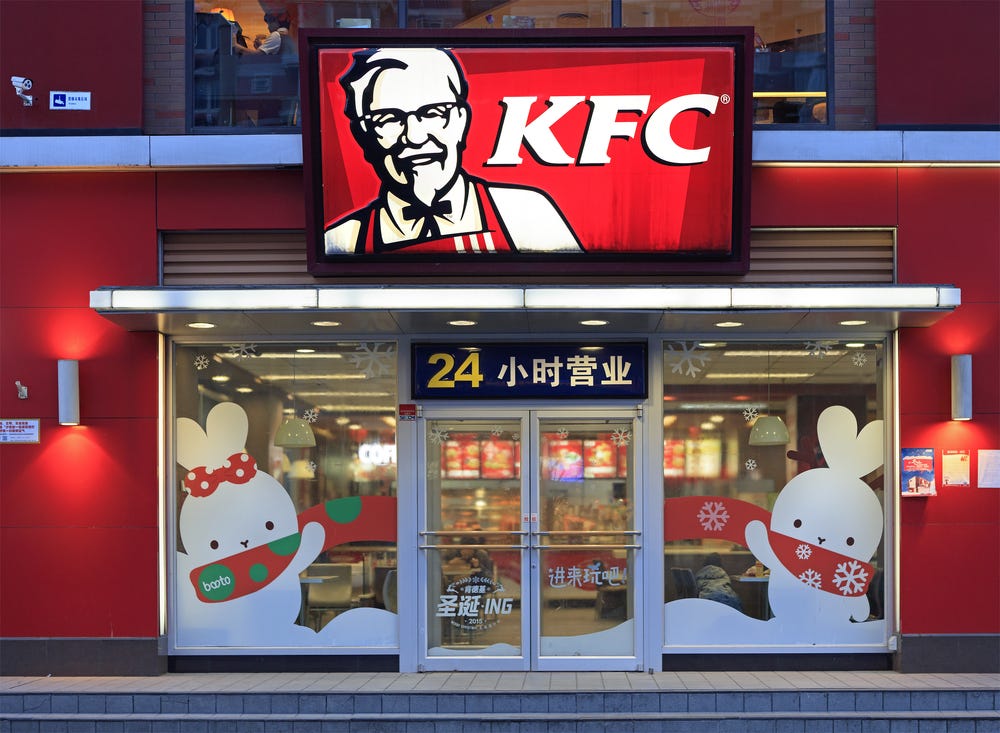Celebrity E-commerce Livestreaming Makes a Comeback for Chinese Valentine’s Day
Plus: Bilibili's new content play, KFC's money moves, and Love is in the Air(Pod)

The summertime Qixi festival is the last and most traditional of China’s Valentine’s Days — following the Western import of February 14 and the internet-era celebration on May 20 (aka “520,” which sounds like “I love you” in Mandarin) — and it’s also the most important for high-end brands.
Premium beauty and luxury fashion labels go all out with their romantic marketing for Qixi, which falls on the seventh day of the seventh month in the lunar calendar (August 25 this year), creating limited edition products, enlisting celebrities, and producing films, games, and other branded content as part of their wide-ranging campaigns to drive sales.
While the hype surrounding e-commerce livestreaming by celebrities appeared to have dropped off a bit after peaking in the run-up to the 618 shopping festival in June, it was back in a major way for Qixi, with several luxury brands making their official debuts in selling through the popular format.
On Taobao Live, top livestream host Li Jiaqi (previously on CCI), who is best known for promoting beauty products, made his luxury sales debut with broadcast for Italy’s Bottega Veneta. The highlight was the rapid-fire sale of 230 mini cloud bags, which sold out within 10 seconds with no discounting required from the RMB 12,300 ($1,790) price tag, showing an increasing willingness by luxury consumers to make online purchases for the hottest products.
Salvatore Ferragamo also timed its livestreaming debut to the Qixi festival, with a special talk show-style broadcast, the “Viva Show,” airing on WeChat with actress Lin Yun, fashion blogger Mr. Bags, magazine editor Sun Zhe, and host Li Chen. The show interspersed demos of the brand’s new Viva Bow handbag line with entertaining segments of truth-or-dare that added a lighthearted element, and drew an audience of 3.25 million viewers.
Estée Lauder partnered with Wangfujing Department Store for the release of the seventh version of Estée Lauder’s New Advanced Night Repair Serum, tying it to the “7.7” date of the Qixi festival. The brand’s livestream featured a special appearance by actor and brand ambassador Li Xian, and fans who watched and interacted had a chance to win merchandise signed by Li.
On JD.com, Lancôme’s livestream was hosted by singer Fu Jing of Rocket Girls 101 and actress and host Wu Xin, which also gave fans the opportunity to win prizes through an interactive lottery. The French beauty brand also released a special Qixi campaign “L’absolu Rouge” with brand spokesperson Kris Wu to promote a special holiday lipstick gift box.
An early report on Qixi sales from JD.com indicates that China’s post-Covid consumer rebound continues apace, with Qixi luxury sales up in the 20%-30% range year-on-year and handbags and jewelry among the most popular imported products. Purchases of investment-grade gold and silver were up 148% year-on-year in the week leading up to the Qixi festival, according to the report.
- by Ginger Ooi, CCI Team
Many of our new readers have the CCI newsletter forwarded to them by a friend or colleague. If you’re a newsletter forwarder, thank you! And if you’re a recipient, welcome! We hope you enjoy our twice-weekly newsletter and consider forwarding it as well.
Mentioned in today’s newsletter: Apple, Bilibili, Bottega Veneta, Bytedance, Douyin, Estée Lauder, Huanxi Media, JD.com, KFC, Lancôme, Pizza Hut, Salvatore Ferragamo, Taobao Live, Xigua Video.

Bilibili’s Latest Content Play Moves Into Bytedance Territory

Video-streaming platform Bilibili (Nasdaq: BILI), best known for high-quality user-generated content that moved beyond the niche subculture of ACG (Anime, Comic and Games) into mainstream lifestyle subjects such as food, beauty, fitness, and travel, is making a major move into top-tier entertainment with an investment in film and television studio Huanxi Media.
Bilibili announced on Monday that it will invest approximately $66 million for a nearly 10% stake in the Hong Kong-listed Huanxi, and will enter into a five-year content partnership that will give Bilibili exclusive online broadcast rights to existing and upcoming Huanxi releases, along with opportunities to jointly develop online entertainment programming such as films and drama series.
Among the major productions on Huanxi’s slate are director Peter Chan’s women’s volleyball film “Leap” (夺冠), starring Gong Li, which was intended for a Lunar New Year theatrical release but was pushed back to the October 1 National Day holiday, and the youth series “Run for the Young” (疯犬少年的天空).
When the coronavirus shuttered Chinese theaters right before the Lunar New Year in late January, Huanxi made history when it moved swiftly to ink a deal with Bytedance to release its anticipated blockbuster “Lost in Russia” (囧妈) to stream for free on Bytedance platforms, including Douyin and Xigua Video (making the latter one of the most downloaded apps of the weeks that followed). It was the first time a film intended for theatrical release in China premiered online instead, and was reported to be part of a RMB 630 million ($92 million) deal between Huanxi and Bytedance that would see the two companies collaborating on future productions and creating a joint streaming platform. A Huanxi spokesperson told Variety that terms of that deal had been satisfied and that there was no conflict between the studio’s agreements with Bytedance and Bilibili.
While much smaller than the juggernaut Bytedance (which has been valued as high as $100 billion), Bilibili continues to see rapid growth, with revenues rising by 70% in the second quarter of 2020 to RMB 2.62 billion ($370.5 million) boosted by increased advertising and paid memberships. Average monthly active users (MAUs) reached 171.6 million, up 55% from the same period in 2019, while the number of average monthly paying users hit 12.9 million, up 105% year-on-year.
While the vast majority of content viewed on the platform comes from users, Bilibili has been investing in more original programming such as documentaries, reality shows, and animation while establishing content partnerships with global networks such as the BBC, National Geographic, and Discovery.
Would a Walmart-Owned TikTok Repel Luxury Brands?

While details remain sketchy, the idea of a jointly Microsoft-and-Walmart-owned TikTok brings up some very interesting questions for the future of content-commerce and the nascent ties between TikTok (and its Chinese counterpart Douyin) and the luxury industry.
This Covid-hit year has seen an unprecedented acceleration of luxury brands’ adoption of digital strategies and platforms in an attempt to stem the bleeding, as revenues from brick-and-mortar stores have all but dried up and consumers who are largely staying in are more reluctant to make big-ticket purchases amid a disastrous global economic outlook and rising unemployment in key markets such as the United States and Western Europe.
For many, this has meant dropping any remaining resistance to e-commerce in places such as China, where the consumer recovery has been robust and the demand for luxury remains strong. Dozens of high-end brands have established a presence on leading platforms such Tmall’s Luxury Pavilion and JD.com, and launched official accounts on Douyin (Bytedance’s Chinese counterpart to TikTok), Xiaohongshu, WeChat, and other local apps in an attempt to buoy revenue in one of the toughest years for luxury since 2009.
Read the full article on Content Commerce Insider
The Content-Commerce Implications of Yum China’s Secondary Listing in Hong Kong

Since changing financial rules to allow for secondary listings last year, the Stock Exchange of Hong Kong has pushed hard to attract mainland Chinese companies following the economic hit taken by local protests and Covid-19, both of which decimated Hong Kong’s crucial tourism and retail markets.
Mainland China, too, is looking to attract more domestic tech firms to offer secondary listings via the country’s Nasdaq-style ChiNext and Star Market tech boards, which are launching charm offensives to attract “red chip companies” — overseas-listed Chinese companies — via what the SCMP called “market-friendly reforms” and “more streamlined, faster IPO vetting.”
Following the lead of Alibaba, which raised $11 billion in its Hong Kong secondary listing in November 2019, and similar moves by major tech players such as JD.com and Netease earlier this year, Yum China Holdings — China’s largest restaurant company and operator of KFC and Pizza Hut in China — has begun taking orders for a Hong Kong secondary listing that could raise more than $2.5 billion.
Read the full article on Content Commerce Insider
Brand Film Pick: Love Is In The Air(Pod): Apple Shows Its Romantic Side for Qixi
China’s Qixi festival, a traditional version of Valentine’s Day, celebrates the mythical story of the “Cow Herder and Weaver Girl,” a pair of separated lovers who are said to meet just once a year on the seventh day of the seventh month on the lunar calendar. Nowadays, Qixi has been transformed into a massive shopping holiday, with big sales and limited edition product releases encouraging Chinese consumers to buy gifts for significant others (and perhaps indulge themselves, too), while brands engage in heated battles over promotions and marketing.
In recent years, brand films have emerged as a choice strategy for introducing new products, promoting deals, and tapping into the holiday spirit. Among this year’s films, Apple’s short “Our Song” (我俩的歌) was among those that resonated most deeply with audiences. Every couple has that one special song that contains sentimental value. With this in mind, Apple invited three couples to revisit fond memories by listening to “their” song with the sound enhanced by Apple’s AirPods.
An elderly couple, Wang Yongkang and Zheng Xiaoling, lip-sync Deng Lijun’s “I Only Care About You”(我只在乎你). A younger pair, Wang Yin and Zhi Yao, laugh as they hear the lyrics to “If Your Heart Was Young”(若你心年轻). Bryan and Gigi, a bit more Westernized in their tastes, listen to the Glass Animals' “Gooey” — first they are spellbound, then Gigi starts to cry.
In every instance, as the music plays, passion is reflected in the subjects' movements while emotions dance across each lover's eyes. Purposely unadorned, “Our Song” is filmed vertically in black and white. The film has no plot, features no excessive performances, and its subjects do not utter a single word across all three segments. Instead of emphasizing cinematic qualities, it allows viewers to focus on the essence of the film.
Despite being a simple recording of three couples sitting face-to-face, the short film conveys to the audience three real and moving stories about love. In the end, when each pair embraces, their love appears to grow even stronger. “Our Love” reflects the appearance of true love — simple, but unique.
The brand film also works as an apt promotion for Apple AirPods’ new audio sharing feature, through which two pairs of AirPods can be connected to the same Apple product, allowing both parties to simultaneously enjoy the same music. To further highlight this new technology, Apple created a crowdsourced playlist, also called “Our Song,” entirely composed of music recommended by couples, for couples. “Our Song” focuses on love's connectivity — the shared feelings between two lovers, the emotions associated with a song and experience, and, most importantly, the role that AirPods can play in bridging lovers and their music, demonstrating how its headphones can serve as the perfect Qixi gift.
- by Ben Guggenheim, CCI Team

News in English
An announcement on TikTok’s buyer could be imminent, though the deal’s closing could be slowed or derailed as a result of new technology export control regulations announced by Beijing. CNBC
With an estimated 90 million Chinese expected to be living alone by 2021, an increasing number of brands are looking to cater to the needs of this up-and-coming demographic. Sixth Tone
Recent quarterly results from Alibaba, JD.com, and Pinduoduo show a lasting impact from the coronavirus on consumer shopping habits, with more activity shifting online. WalktheChat
The discount-oriented social e-commerce platform Pinduoduo made history as the youngest firm to join the Nasdaq 100, an index of the largest and most actively traded companies on the exchange. Pandaily
Chinese fashion brands are taking their runway shows on the road to scenic domestic destinations such as Dunhuang and Yangshuo, where new backdrops can offer appeal for branded content offerings. WWD
How C-beauty brand Perfect Diary has combined low prices and social media content such as livestreaming and short video to challenge global cosmetics giants in just a few short years. Reuters
China leads the world in brand value growth over the past decade, according to a new report from Brand Finance, which sees the country’s brand’s growing nearly eight times faster than the overall global rate. Shine
Smartphone maker Oppo plans to move into content with the launch of its own short video platform later this year. SCMP
Hong Kong’s stock exchange is considering further tweaking its rules to allow for more major secondary listings of companies such as Tencent Music Entertainment. SCMP
We’ve Got China Covered


